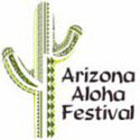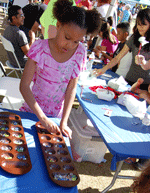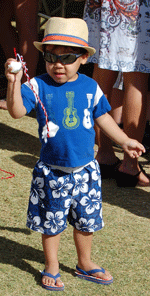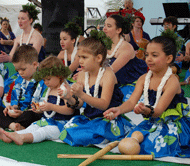Keiki Activities
|
 |
 |
Visit our guest, the Bishop Museum (Honolulu), for ʻOhe Kāpala bookmark stamping. Tradionally used for stamping kapa (bark cloth), the designs are a form of Hawaiian artwork. |
 Setting up for a game |
The game of Chongka is loved by the Chamorro people of Guam. Although versions of the game are found all over the world, we utilize traditional boards from Guam.
Chongka is played on a narrow, wooden board that is usually about 28 inches long. Seven shallow holes, each about two inches wide, run across each player’s side. At the end there is a larger shallow hole. The object of the game is to end with more playing pieces than your opponent. Our volunteers will be happy to teach the game and play it with you. Versions of the same game can be purchased in many stores, but for one the same as our boards you might have to go to Guam! |
|
Konane is a two-person strategy game similar to checkers. It is traditionally played with white coral and black lava "stones" on top of a large carved stone. During Makahiki Season, (fall and early winter), Hawaiians of all ages would compete to see who was the best player. This game was also used by many Hawaiian warriors and High Chiefs to learn strategy for battle. King Kamehameha was a formidable opponent when he played Konane, many tried to challenge him but lost. Challenge someone to see who will win! |
 Roll it! |
Ulu Maika and Moa Pahe'e are ancient Hawaiian sports similar to lawn bowling.
Ulu Maika and Moa Pahe'e were traditional pastimes played by rolling a small disk-shaped stone or a wooden torpedo-shaped dart down a path. The player rolling the stone or sliding the dart the furthest was the better player. * Please check the program for scheduled times each day Bring a friend and test your skills! |
Learn a Hula A seated hula, called a noho hula, involves learning simple arm movements. Join Kumu Tiana Price of Halau O Ka’anohiokala to learn to hula to the songs Pupu Hinahina, about finding a seashell on the beach (on Saturday) or Ke Ao Nani, about the beautiful nature all around us. (on Sunday ) Saturday or Sunday at 10:30 a.m. |
 Learning starts at any age |
Poi 'balls'are used by Maori women performers as a rhythm instrument or accompaniment for group dances. There are two styles, the short cord and the long cord. Swinging welcome! |
Prepping for Kapo Rakau |
The Maori have many games to teach hand and eye coordination while having lots of fun. Here’s two: Titi Torea is a seated game where players toss small sticks back and forth in rhythm. Kapo Rakau is played while standing in a circle. Players toss longer sticks to the person next to them while learning ‘right’ and ‘left’ Don't drop it! |
| Web Problems? Email us! 2025 Arizona Aloha Festivals, Inc Last Page Update: February 14, 2025 5:07 PM |

